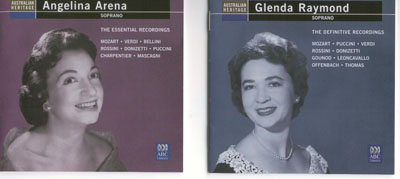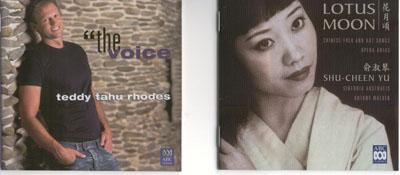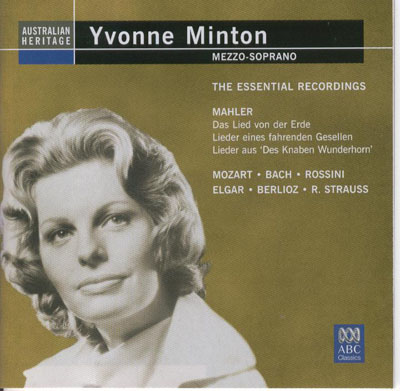





ABC Classics, Vocal recitals
www.abcshop.com.au/abcclassics
What a wealth of musical pleasures is generously made public by the Australian Broadcasting System, a feature which actually should be followed by so many other music radio stations. It’s hard to select favourites out of the available catalogue but I was in general very much impressed by most of the releases and will return to them often for listening pleasure. Let’s get started with a name which was completely unknown to me : Glenda Raymond (born 1922). The station’s ‘Australian Heritage’ series released a ‘definitive recordings’ CD in 2003. And what a revelation she was: Raymond a sort of Australian ‘Mado Robin’ didn’t have any stage career worth speaking of (through her own choice) and her appearances were limited to radio broadcasts and concert appearances.
This ‘natural’ singer and Melba impersonator who did have a some lessons with Dino Borgioli sings quite a varied repertory on this cd made up of live performances and mainly broadcasts. There are excerpts from Rossini’s Barbiere and Offenbach’s Les contes d’Hoffman and arias and duets from Bohème, Hamlet, Rigoletto, Faust, Mireille, Roméo et Juliette, Martha, Mignon and Pagliacci amongst others. In these she is partnered by tenor John Lanigan and baritones David Allen and Geoffrey Chard. Included are also ditties by Tosti, Burns and Proch’s famous variations.
One of the best books I’ve ever read on opera history was John Cargher’s “Bravo, two hundred years of opera in Australia” (grab it whenever you see it) and I was pleasantly surprised to see the same author was also responsible for the excellent sleeve notes of the Raymond CD. Cargher who must have heard her frequently judges her voice “pure and well-placed” which is also the impression you get from listening to the recordings. Raymond is also capable of beautifully coloratura with an excellent and extended top register and in the Barbiere excerpts she also displays a true comedy style.
Angelina Arena (born 1926) is another revelation and contrary to Raymond a singer who really had an operatic stage career yet for some reason doesn’t even get mentioned in the legendary (but not fault-ridden) Kutsch-Riemens Saengerlexicon. So I had to rely on the sleeve notes and some reference books to acquire some info on this singer. That she doesn’t even get a mention in the aforementioned Cargher book doesn’t surprise as Arena’s career was mainly spent outside the continent she was born on. A winner of the Australian ‘Sun Aria’ contest in 1951 she went to study for two years at the Verdi conservatory in Milan while also taking classes with legendary Mafalda Favero.
Participating in other competitions and several performances eventually led to her Scala debut in the 1962-63 season and an international career was launched. This CD entitled “The essential recordings’ is representative of the repertoire she sang.
Having been an understudy for Joan Sutherland at la Scala (Lucia), Lucia’s aria is included with Sonzogno conducting her in 1964. It are these early sixties recordings which show her in her best voice, they also include arias from Barbiere, Lodoletta and Traviata under Gavazzeni, Louise, Tosca, Sonnambula, Rigoletto, Falstaff, Ballo and Don Giovanni.
Of more recent stock is a CD release (2004) of the New Zealand baritone Teddy Tahu Rhodes.
Judging from the cover photograph he could easily be any girls’ pin-up boy yet luckily the guy also possesses a voice. “The voice’ as the CD’s title goes sings arias from Carmen, Puritani, Faust, Pique Dame, Tannhauser, Edgar(!) the duet from Pecheurs, Haendel, Bach, Grainger, Tomoana and some traditionals.
The former accountant’s voice is very impressive because of its dark burnished sexy timbre. Yet the top register is less spontaneous and sounds a bit laboured which made me think the guy is perhaps more of a bass or bass baritone than a baritone per se. Listen to the Bach and Haendel and judge for yourself. The Messiah’s ‘Why do the nations” is a tour de force. The enunciation of the text is excellent and I was able to understand every word he sang whether in English, German, French or Italian. As far as I know Rhodes is also the first singer to record Frank’s “Questa amor” from Puccini’s Edgar on a solo album. The duet from “Pecheurs” though is marred by David Hobson’s squeezed goat-like tenorino. Percy Grainger’s ‘Shallow Brown” is another tour-de-force as Rhodes throws himself completely in this music with a free and resonant upper register as well.
While Korean songs have become more and more available to the West because of recordings by Sumi Jo and Hei-Kyung Hong Chinese vocal music is still sort of struggling to get wider recognition outside the vast nation itself. The first acquaintance I made with Chinese songs was through a fifties’ recording of the famous bass Yi Kwei-Sze (Concert Hall CHC-48) Then we he had to wait until 1993 for another –still easily available- release by soprano Qilian Chen (Pavane ADW 7299). Both Chen and Sze used a piano as accompaniment. The 2001 ABC release with soprano Shu-Cheen Yu uses an orchestra which in my view makes the music much more accessible. Especially as Julian Yu’s arrangements are absolutely wonderful and should become more widely known. And if you think you’re absolutely unfamiliar with Chinese music just try the first track on the album (Jasmine) and you’ll immediately hear where Puccini got part of his inspiration for his Turandot. Shu-Cheen Yu became a full member of Opera Australia in 1996 and is the possessor of a fine lyric coloratura (trill included) both in the Chinese songs (10) and the operatic items which include Turandot, Butterfly, Zauberflote, Il Re Pastore, La Rondine and Schicci. She also sings arias from Haendel’s Joshua and Samson and concludes the album with Caccini’s Ave Maria in an orchestral arrangement by Julian Yu. Julian Yu is not only excellent in his arrangements but reveals himself to be an excellent sleeve note writer as well. This release is a more than welcome addition to any music library which dares to go beyond its usual repertory.
Last but not least ABC’s release of a double CD portrait of Yvonne Minton was long overdue and a great tribute to this remarkable mezzo. Mind you while the other ABC issues contain interesting broadcast performances and rare non-commercial recordings, the Minton box is mainly made up of her recorded legacy for Decca. It does include a primer though in the first CD release of an excerpt from Rosenkavalier with bass Michael Langdon under Solti and the orchestra of the Royal Opera House.
The 47 booklet includes several beautiful photographs but also a revealing and touching portrait of the artist. “The essential recordings’ include lots of Mahler (Lieder and Das Lied von der Erde) and arias from Rossini’s Stabat Mater, Berlioz’s Damnation, Non so più from Nozze, Bach’s Laudamus te, Elgar’s Dream of Gerontius and two excerpts from Rosenkavalier one with Régine Crespin as the Marschallin. Get the CD’s and just sit back and relish in the glorious warm Minton sound which has strength and beauty of interpretation in everything she does. Too bad ABC decided to include Solti’s go at “Das lied von der Erde” not only because of Solti’s annoying approach but also because of René Kollo’s failure in this music. But luckily Minton’s legendary Sextus in Mozart’s Clemenza under Davis is included and easily sums up her artistry.
Rudi van den Bulck, Opera Nostalgia